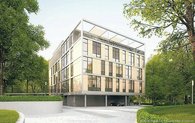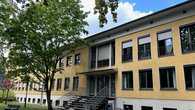
Awarded Silver: The GeoBioLab
In order to be in a position to work economically, especially small and highly equipped laboratories should be connected to the technology infrastructure of already existing laboratory buildings. Technology must be bundled so that synergies can be exploited. At the "Albert Einstein" Science Park, this requirement turns out to be one of the greatest sustainability challenges.
With the GeoBioLab, starting operation in June 2021, the GFZ avails of a new building that meets the highest innovative demands in a variety of ways. With the construction of this laboratory building, the GFZ is committing itself to sustainability in its complexity of ecological, economic, functional and socio-cultural dimensions. This building is being awarded the "Silver" certificate on the basis of the criteria catalog (BNB_L) of the "Sustainable Building Assessment System" specially designed for laboratory buildings, which the Federal Ministry of the Interior, for Building and the Home has conceived and established for all research buildings with a larger proportion of laboratory use.
With the GeoBioLab, all sustainability criteria have been taken into account to the same extent. With the completion of the building A71 – GeoBioLab next to the building complex B-G on the grounds of the Science Park, the additional needs of the laboratory-based sections are met. The building also integrates a server room to consolidate the computing and storage capacity of the entire GFZ and accommodate the expected growth for the next ten years. The building's multidimensionality is one of its greatest achievements. This is because the combination of server room and highly equipped laboratories is expected to bring considerable technical and economic advantages. For example, the enormous waste heat from the computers can be fed into a local heatingnetwork with the B-G building complex and be used to heat primarily the laboratory supply air as well as offices. The GeoBioLab itself does not have a heating system, rather its heating requirements are entirely covered with waste heat.
In future, new buildings as well as major structural changes are subject to the same requirement: the consideration of all criteria with respect to sustainability and to fully comply with our function as a future-oriented research institution.
Sustainability in building projects: The GFZ responds to criticism of demolition and new construction
The German Environmental Aid DUH has criticised the GFZ German Research Centre for Geosciences for a planned building demolition and replacement on Potsdam's Telegrafenberg: Demolition would mean the loss of raw materials and increase resource consumption. However, the criticism is based on incomplete information. For example, DUH writes that "the option of renovation was not listed in the tender, although the basic structure of the building would allow it".
The correct wording should be: "The basic structure of the building did not allow for refurbishment because the building cannot meet the required space and functional needs. Neither refurbishment nor expansion can meet the identified space requirements in terms of quality and quantity at this location. Therefore, a refurbishment was not included in the tender. In addition, the built-up area of the building is the only location on which the GFZ can build at all on the Telegrafenberg science campus.
The currently existing building has deficiencies in thermal insulation and fire protection, there are recurring odour nuisances and the basement rooms are drenched. The low ceiling height of the basement also massively restricts the possibilities for use.
The GFZ staff and the GFZ board have repeatedly and intensively dealt with the question of preserving the building. This took place both in an internal multi-stage participation process and in discussions with the supervisory board. In the participation process, which determined the required space and function needs with great participation of the staff, a working group explicitly dealt with the issue of preservation versus demolition and new construction. The result of the process was that preservation and renovation could not cover the space requirements and the desired functions of the building.
An external commission came to the same conclusion. One of the entries in the architectural competition for a new building had envisaged the preservation of the building. The jury rejected the entry because it would not meet the space requirements to be satisfied at this location either in quality or in the necessary quantity.
Sustainability in research and action is an important value and benchmark for the GFZ. This applies to the maintenance and energy-efficient renovation of existing buildings as well as new construction projects. As recently as the beginning of 2023, the GFZ's new laboratory building "GeoBioLab" was awarded a silver certificate for sustainable construction.
We would have been happy to provide DUH with these arguments before our new building project was included in their negative list. DUH only informed us about their assessment the day before their planned press conference.



